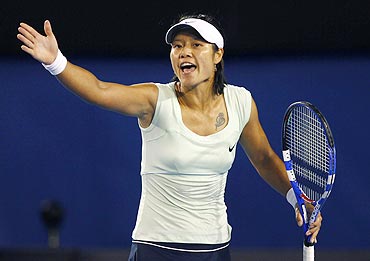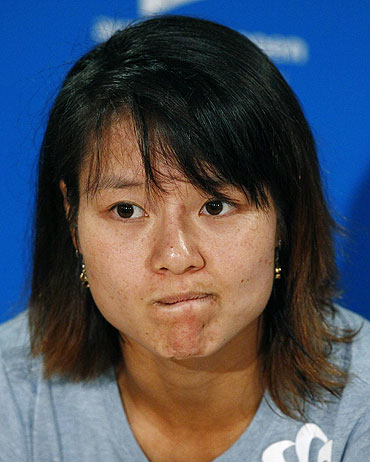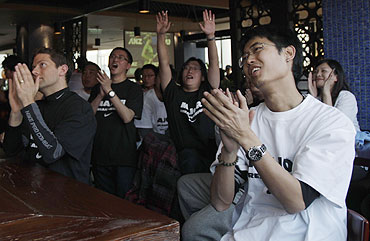 | « Back to article | Print this article |
'There were a lot of people coaching me'
National pride turned into a "rally of abuse" for tennis player Li Na after she shouted at Chinese spectators not to teach her how to play tennis during Saturday's tense final against Kim Clijsters in the Australian Open.
While 28-year-old Li, regarded as a rare rebel in tightly controlled Chinese sporting scene, became "national hero" after scoring brilliant victories against top pros in the tournament and the first Chinese woman to reach Grand Slam final, her outburst in the summit clash, which she lost, did not go down well at home.
As she came under pressure from Clijsters in the second set, Li appeared fed up with shouts from Chinese fans giving her advise how to play, prompting her to complain to the British umpire saying "can you tell the Chinese spectators not to teach me how to play tennis?"
"There were a lot of people coaching me. It was really loud," Li said at the press conference in Chinese after the match.
'Li acted like an outsider'
Her remarks upset Chinese micro bloggers with some questioning her attitude, state run Global Times newspaper said in a report.
"While being a Chinese, Li asked a foreigner (British umpire) to demand the Chinese spectators stop shouting, making her just like an outsider," it quoted a microblogger as saying.
The Southern Metropolis Daily in its commentary said Li's request to the umpire represented her fragile state of mind in a game where she could not control her temper, and also had a bad impact on China's international image.
Commenting on the reaction, Zhou Xiaozheng, a professor of sociology at Renmin University of China, said that a nationalist mindset was to blame for the problem. "Chinese spectators have always attached the result of a sports game to the national image," Zhou said.
'Chinese should actually learn from Li Na's personality'
Apparently it was particularly sensitive for Li as she quit official tennis in China after she went ahead and married her coach Jiang Shan much against the advises of the officials of Chinese Tennis establishment.
And the coaching tips from the spectators, apparently aimed at putting her husband who was present during the match in a tight spot, did not go down well with Li.
At the end of the match, she made it a point to make an emotional complement to her husband saying, "It doesn't matter if you are fat or skinny, handsome or ugly, I will always follow you, always love you."
Li's characteristic style remarks however drew praise from editorial of the Global Times where the official daily said Chinese should actually learn from "Li Na's personality".
Chinese fed up with cliches
"Some foreign media outlets regard Li as a 'Chinese tennis rebel'. Indeed, she has many characteristics to validate this new title -- she wears a rose tattoo on her chest and employs her husband as personal coach; she first thanked her sponsor at the award ceremony, and even asked the chair umpire during the tense second set: "Can you tell the Chinese don't teach me how to play tennis?," the editorial said.
"In fact, such "rebelliousness" didn't upset the Chinese, because they've been fed up with clich s like "thank my leaders" or "thank my comrades.
Furthermore, being reminded to behave with great care is probably the last thing they want while watching a game. Chinese society and its people need to relax. They need a little humour and open-mindedness to cope with small mistakes, and imperfection should be allowed from time to time.
"Being excessively "correct" can lead to untruthfulness and pressure. China is not as "correct" as it was in the past. However, isn't this China more lovely and real?" the editorial said.
'Chinese should actually learn from Li Na's personality'
"The story of Li Na becoming the first Asian to play in a Grand Slam singles final has enriched the narrative of China's rise. Nowadays, many Chinese like Li are going global and pursuing their life goals with their vivid personality. They are not obliged to represent China, but they demonstrate a more natural and realistic profile of the nation.
"China is neither perfect nor wicked -- it is just a complicated, colossal developing country. Each and every one among us is a part of this complicated entity. With this thought, we can relax and be ourselves on many occasions," it said.




